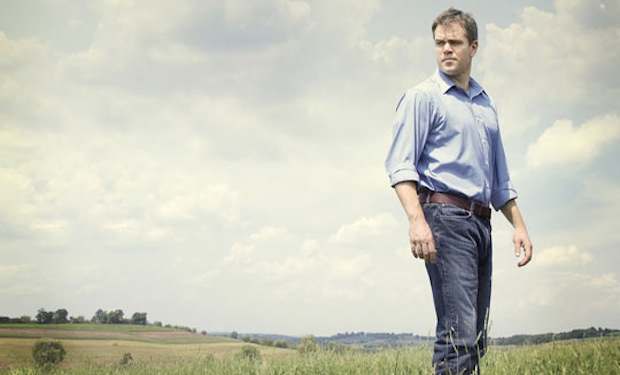 Promised Land, the new eco-themed Matt Damon/John Krasinski flick, hit theaters yesterday with a resounding “Meh.” Justin Chang at Variety calls it “a quietly absorbing if finally somewhat dubious drama.” “Wispy, over-earnest,” says Ann Hornaday at the The Washington Post.
Promised Land, the new eco-themed Matt Damon/John Krasinski flick, hit theaters yesterday with a resounding “Meh.” Justin Chang at Variety calls it “a quietly absorbing if finally somewhat dubious drama.” “Wispy, over-earnest,” says Ann Hornaday at the The Washington Post.
But of course, this isn’t just any tale of corporate greed sullying bucolic, rural America. It’s about hydraulic fracturing, or fracking, a controversial method of oil and natural gas extraction that is sweeping across parts of the country.
Daniel Penner summarized the movie’s plot thusly for Grist:
Corporate salesman and all-American good guy Steve Butler (Matt Damon) tries to sell a teeny, depressed Pennsylvania town on the benefits (i.e. mad cash money) of fracking. Just as it looks like we’re headed for a happy ending, with a well on every plot and a fat wallet in every pocket, Butler is thwarted by a tenacious environmentalist (John Krasinski), some bad press, and a plaid-clad voice of wisdom (Hal Holbrook).
So of course the pundits and greenies have weighed in as well. Kyle Smith in the New York Post calls Promised Land a “groaner of an agenda movie,” referencing reports that the film was partially funded by “the enemies of our domestic gas industry — the foreign oil nabobs in the United Arab Emirates.” Right wingers at the Heritage Foundation and elsewhere did their best to use this information (apparently true) to discredit the film — months before any of them likely saw it.
Mark Brownstein at Environmental Defense Fund, meanwhile, argues that the film “is not reflexively anti-natural gas.” “You will be sorely disappointed,” he writes, “if you go to the theatre expecting to see lurid visuals of sinister-looking waste water ponds, plumes of diesel soot and road dust, or bucolic landscapes scarred by roads and pipes.” (Um, yeah. That’s totally what I was looking for in a night at the movies.)
A couple of things bear mentioning here. First, Promised Land didn’t start out as a movie about fracking. Krasinski, who co-wrote the script with Damon (with a little help early on from Dave Eggers), told the Pittsburgh Post-Gazette that it was originally going to be about a wind energy development. Here he is talking to Michael Ordoña at the San Francisco Chronicle:
“When fracking came into the discussion, we started reading this series in the New York Times called ‘Drilling Down,’ and I’d seen a ’60 Minutes’ piece called ‘Shaleionaires,’ about people who were literally becoming millionaires overnight. People had so much potentially to gain, so much potentially to lose (because of environmental impacts associated with fracking). So they were making very, very human decisions. Survival decisions. This wasn’t a political discussion anymore, an intellectual exercise. This was an everyday affair for these people.”
And true enough, there’s actually very little about fracking in Promised Land, other than a couple of quick lines explaining what it is and a (deliberately) dumbed-down eco-scare lesson by Krasinski in front of a classroom full of schoolkids. One walks away with only the vague feeling that we really don’t know much about the impacts — which is actually true, and more than a little unsettling.
But if this is a movie about the soul of blue-collar America, as Krasinski and Damon would have it, then it’s lacking there, too. As Lisa Kennedy writes in the Denver Post, “Promised Land does a careful job honoring small-town America.” But in doing so, it plays down the rage that boils beneath the surface of many rural communities and the deep cultural divides that fracture many small towns. The characters in this film are all too willing to go along with whoever seems to have the more compelling story to tell. They feel a little too salt of the earth, a little too simple-minded, to be real.
Jeanette Catsoulis, in a review for NPR, points out that “Promised Land (unlike Josh Fox’s searing 2010 documentary Gasland) isn’t a howl of anger against corporate callousness.” Which is fine, but having lived through a natural gas boom in a small town in Colorado, I can tell you that in the real world, locals do a lot of howling at each other when big business comes to town.
And that’s just how big business likes it. A number of commentators have said that the final plot twist ruins the affect of Promised Land. I won’t tell you what it is, but I will say this: It is more than a lefty contrivance. It’s too bad that it is made less believable by the rest of the film’s simplistic portrayal of small town America.
In the end, Promised Land, however thin, is a worthy effort. The fracking boom has ridden largely on corporations’ ability to sweep into rural communities and snap up drilling rights before the locals realize what is at stake, and before the scientific and democratic processes can play out. If this film does nothing else but prod people to think twice before signing on to these drilling schemes, then it will have contributed something to the debate — even if the film itself is something of a snooze.



